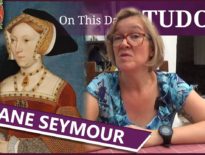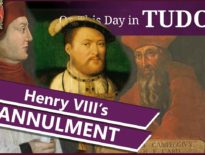On this day in Tudor history, 1st June 1593, the inquest into the death of playwright, poet and translator Christopher Marlowe took place.
Twenty-nine-year-old Marlowe, writer of such famous works as “Tamburlaine”, “Dr Faustus” and “The Jew of Malta”, had been fatally stabbed at a house in Deptford Strand, London, by a man named Ingram Frizer on 30th May 1593, but what happened?
In today's "on this day" talk, I share William Danby's coroner's report on what happened that fateful day.
Also on this day in Tudor history, 1st June 1533, Whitsunday, a pregnant Queen Anne Boleyn, Henry VIII’s second wife, was crowned queen at Westminster Abbey in a ceremony performed by her good friend, Thomas Cranmer, Archbishop of Canterbury. Find out more in last year’s video:
You can find out more about Marlowe and the theories regarding his death in my video for February 26 – Christopher Marlowe – a rather colourful character!
The books I mentioned can be read online:
Christopher Marlowe by Frerick S Boas - https://archive.org/details/in.ernet.dli.2015.461513/page/n295/mode/2up
The Death of Christopher Marlowe by J Leslie Hotson - https://archive.org/details/deathofchristoph008072mbp/page/n39/mode/2up
Also on this day in history:
- 1451 or 1452 – Birth of Giles Daubenay, administrator, soldier, and diplomat. He was influential in Henry VII's reign, and Catherine of Aragon wrote that "he was the man who could do most in private with the king".
- 1563 – Birth of Robert Cecil, 1st Earl of Salisbury, politician and courtier. Cecil was the son of William Cecil, 1st Baron Burghley, and his second wife, Mildred. It was Cecil who proclaimed the accession of King James I after Elizabeth I's death.
- 1571 – Execution of Catholic martyr and civil lawyer John Story, at Tyburn.
- 1573 – Birth of explorer James Rosier in Suffolk. Rosier went on the 1605 voyage to explore the fishing grounds off the Maine coast as "cape merchant, observer, and reporter", and recorded the voyage in a journal.
- 1579 – Death of Robert Horne, Bishop of Winchester, at Winchester Place, Southwark. He was buried at Winchester.
- 1583 – Death of George Carew, Dean of Exeter and Dean of the Chapel Royal. He was buried at St Giles-in-the-Fields, London.
- 1598 – Death of Thomas Preston, playwright and Master of Trinity Hall, Cambridge. He was buried in Trinity Hall Chapel. He is best known for his play "Cambises".
- 1616 – Burial of Sir Thomas Parry, MP and administrator, at Westminster Abbey. His father was the Thomas Parry who was Comptroller and Treasurer of Elizabeth I's household.



Robert Porley was the creature of Francis Walsingham so he could well have been murdered, but of course Marlowe was a man of violence so this fight may have well been just one of those things and the witnesses bribed to conspire the outcome of the inquest. Marlowe was an atheist, a spy and was in trouble for atheism. The attack seems very constructed. Ingham was also in the pay of Walsingham and the whole attack could have arisen for numerous controversial ideas, homosexuality, atheism and so on. Personally I think I believe it was a brawl that went wrong, but may have been over his beliefs and spy work.
Kit Marlowe cannot be Shakespeare as he was killed in 1593 and most of the Bard’s famous works are later on. Most were as the Kings Players. In Shakespeare In Love William thinks he has caused his death by telling the Lord who his girlfriend is to marry it was Kit who was wooing her. He became distressed and people think he has committed suicide until he turned up at the house and gave them all a terrible fright. He is most relieved to find he hasn’t caused Marlowe ‘s death.
I have to admit I think all of the theories about other authors writing Shakespeare are nonsense and I have read a number of books on the Authorship Question but Bacon and Marlowe are the most luxurious. Marlowe because of his date of death and Bacon because of his age. Then you have William Stanley, the Earl of Oxford who was also a love child of Elizabeth I and the Earl of Southampton and several others. Shakespeare was also a woman just because he was called the Swan of Trent or something and so on. This all started in the 1880s and has been revised again now. I really get a headache going through each theory. The majority can be easily dismissed. One argument is about how his name was spelt which shows these people have no idea of English. Nobody spelt their name the same way as it is today. A lot of people had several ways to spell things, including their names. English wasn’t standardised until the eighteenth century. Then they say he was low born and uneducated. Nonsense, he was better educated than most people today. He wasn’t low born either. His mum had a rich farm, his dad was a government swindler, he was involved in the wool trade, a glove maker and a debt collection agent. He was on the Corporation. Shakespeare had a posh house. He had money. His men were probably also educated. He was able to buy his dad and himself a coat of arms. New Hall Place was a substantial manor. Have these people any idea how important you have to be to be buried in front of the high alter of a Tudor Church? His entire family had money. Even when they lost a good deal of it they regained much later on. He may not have gone to University, most people, even well educated ones didn’t. England had very few decent Universities compared to the rest of Europe. The elite only went to Oxford and Cambridge, even those with money might not get in. The Earl of Oxford wrote a lot of stuff, but the evidence doesn’t mean he was Shakespeare.
Shakespeare is also said that he couldn’t have written accurate history without an Oxford education. Therefore his patron wrote them. True he probably couldn’t because he might not have had access to the chronicle he used. Well, Shakespeare didn’t write history, he wrote political entertainment and there isn’t anything at all accurate in his history plays. The chronicle had been published anyway so it was widely available. It’s plausible that he had a team of writers, collaboration and help with his research. The man was a born genius, he didn’t need to go to Oxford and Cambridge. His plays are full of local references, swearing and pub humour, the language of the tavern, local trades, commercial language, local words from the heart of Warwickshire, where he grew up: not the refinement of upper social life. I can’t accept he didn’t write the plays, even though the literature is growing around the Authorship Question. It can be easily refuted.